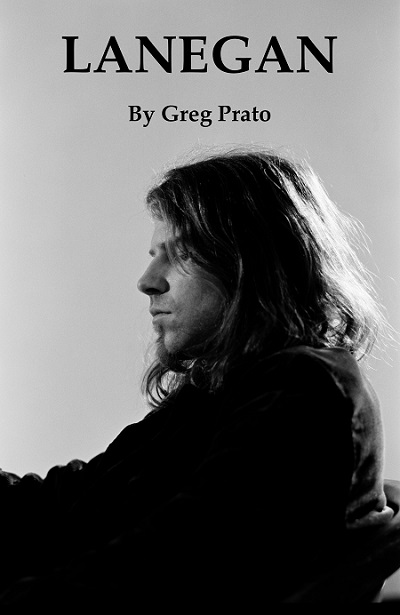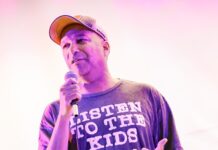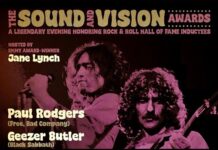By Greg Prato
Many consider the “Big 4” of grunge to be Nirvana, Pearl Jam, Soundgarden, and Alice in Chains. However, if there was a “Big 5,” the Screaming Trees would have been a worthy addition — led by one of rock’s all-time best (and instantly recognizable) voices, Mark Lanegan. Having passed away on February 22, 2022 at the age of 57, the singer is now the focus of a new book assembled by little old me, simply titled Lanegan, which pays tribute by collecting exclusive interviews with musicians, friends, and admirers.
During a career that spanned 1984-2000, the Trees spent the ‘80s issuing albums on indie labels, before making the jump to a major (Epic), and issuing what many consider to be their three best (and certainly best-known) efforts — 1991’s Uncle Anesthesia, 1992’s Sweet Oblivion, and 1996’s Dust. Additionally, the group reached an enormous audience when their most renowned tune, “Nearly Lost You,” was included on the mega-selling motion picture soundtrack to the 1992 film, Singles. However, there has been quite a bit of mystery as to why and how the Trees split up. Here in this exclusive excerpt from the Lanegan book, the band’s guitarist tells his side of the story.
GARY LEE CONNER: It was a surprise that he announced it on stage and didn’t tell us [that the Trees were breaking up, during a performance on June 25, 2000, at Memorial Stadium in Seattle, as part of the opening of the Experience Music Project]. Because at that time, everyone was off doing their own thing. What happened after Dust is we’d been with the management company Q Prime — that was a big mistake. Those guys were too “big time.” They wanted to be involved musically in what we were doing. The record company never cared what we were doing musically, but these guys were like, “These songs aren’t good enough.”
Peter Mensch and Cliff Burnstein, the Q Prime guys who managed Metallica, Def Leppard, and they got Smashing Pumpkins after us. Mark started cancelling a lot of shows in ‘96/‘97 after Lollapalooza. They had enough, so they just dropped us. And then at the same time, we decided we wanted to get off Epic, and they let us go when we asked them to. They didn’t drop us. We owed them a million bucks — probably half of that were the videos we did. Videos were a waste of money.
So, we played a few shows in ‘97 — we did a west coast thing, in Seattle. And then I moved out to New York where my wife lives, and I went back to college and got my bachelor’s degree. And Van had a family in the Seattle area, and Lanegan moved down to Los Angeles. I had been writing some stuff, and it was the summer of ‘98, my wife and I went to Las Vegas — to go to the Star Trek Experience thing, which was kind of lame — and I get a call from Lanegan on my answering machine. I called him, and he said, “You’ve got to come up to Seattle and do this demo…right now!” He always had a sense of urgency about everything like that.
So, instead of flying back to New York from Las Vegas, I had to fly to Seattle to do this demo — and that was part of the stuff on Last Words. I remember that was one of the ones that Peter Buck played on — Barrett was friends with him. So, we recorded that and we were thinking, “Maybe we can get on a major label.” We didn’t want to be on an indie label, although we probably could have done something on Sub Pop. But also, ‘96 and on, the time for rock music was really waning – it wasn’t like in the early 2000’s, where it picked up again.
And we got together two or three times to do demos and did a few shows — we played the Roxy and the Viper Room out in LA. And then, we got that Experience Music Project show — which is now the MoPOP [Museum of Pop Culture] series. They’ve got one of my amps and guitars. It’s like, rock n’ roll doesn’t belong in a museum…but there it is. I’ve always hated the Hall of Fame kind of thing. But they offered us $65,000 – which before, probably the most we got was $10,000. $65,000 for one show. We all probably got a few thousand dollars after all the bills. There’s always bills. [Laughs] And I had to fly out to Seattle. I didn’t even know until after the show that he said that. Somebody said, “Oh…this is your last show?” And I’m like, “What?!” I guess I was kind of numb to it. It didn’t really affect me then – it was surprising, but on the other hand it’s typical that he doesn’t tell us what’s going on.
And also, he was the one that was always so resistant to breaking up. I know a couple of times in the book [Sing Backwards and Weep: A Memoir] he apparently talked about telling us…I don’t know the time he’s talking about in ‘91. That was when we needed to find another drummer – we had Uncle Anesthesia and we didn’t really know what we were going to do. So, he probably didn’t even tell me about that one, because it’s typical — he doesn’t tell me what’s going on. We spent like, 15 years wondering what was going on.
I probably spent ten years mourning the whole thing – because I was never in another band. That was my band, y’know? The only other bands I’d been in were the ones with Van — cover bands. And I haven’t been in another band since. So, it took me about ten years before I finally got over it.
Lanegan is available in paperback, hardcover, and Kindle versions, and soon, an audio version.




















